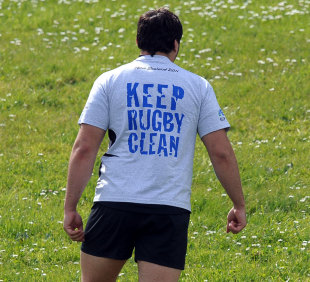|
International Rugby
IRB confims eight anti-doping violations in 2011
ESPNscrum Staff
March 5, 2012

The IRB were keen to emphasise their message during the 2011 World Cup
© Getty Images
Enlarge
The International Rugby Board has revealed that there have been eight anti-doping rule violations in 2011 in what has been a year of substantial testing and education. The organisational body undertook 1,714 tests across the XV and Sevens format of the game in every continent during 2011. Of the 1,714, 587 featured in competition and 1127 occurred outside. And they also rolled out a record blood testing programme at the World Cup with 989 Tests occuring. Despite the rigorous testing programme, there were eight anti-doping rule violations in 2011. That amounts to 0.46% of the total testing programme. Four violations were for stimulants (Methylhexaneamine found in nutritional supplements), two were for anabolic agents (Testosterone), one for a diuretic (Probenicid) and one for a narcotic (Oxycodone) used for pain relief. There were no positive results recorded in Sevens. Commenting on the record programme, IRB Anti-Doping Manager Tim Ricketts said: "The IRB and its Member Unions are committed to the fight against doping in sport. This record IRB testing programme, combined with over 4,000 controls administered in 2011 by our Member Unions and their respective National Anti-Doping Organisations as well as a dedicated education programme, underlines our collaborative commitment to this critical area of the Game." "While Rugby continues to be at the forefront in the fight against doping in sport, we have a collective responsibility to ensure that our players, physicians and administrators have access to the very best educational framework." "This includes the education around the dangers of failing to check nutritional supplements and medications thoroughly and awareness around recreational drugs and support mechanisms. All of the violations that were recorded in 2011 could have been avoided if players and their physicians had checked the ingredients of the products against the WADA Prohibited List prior to taking them." © ESPN Sports Media Ltd.
|
Live Sports
Communication error please reload the page.
-
Football
-
Cricket
-
Rugby
-
- Days
- Hrs
- Mins
- Secs
F1 - Abu Dhabi GP
Abu Dhabi Grand Prix December 11-131. Max Verstappen ()
2. Valtteri Bottas (Mercedes)
3. Lewis Hamilton (Mercedes)
4. Alexander Albon ()
5. Lando Norris ()
6. Carlos Sainz Jr ()
-
ESPNOtherLive >>
Darts - Premier League
Golf - Houston Open
Snooker - China Open
Tennis - Miami Open

